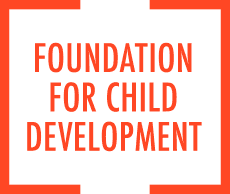All Financing Early Childhood Education Resources (cont'd)
- New Bipartisan Policy Center Resources: Strengthening Early Care and Education Systems and Reducing Child Poverty
The Foundation for Child Development is committed to ensuring that all young children thrive, especially through the promotion of high-quality early care and education systems and the socioeconomic well-being of families.
September 23, 2021 • Read MoreFirst Large-Scale Study Finds Child Care, Coupled with Infection Mitigation Efforts, is Not Associated With Spread of COVID-19Foundation for Child Development Grants in Action New Haven, CT (October 14, 2020) — Amidst ongoing debates over the safety of schools and child care, researchers at Yale University collaborated with Child Care Aware of America to conduct the first-ever large-scale assessment of the risk of working in child care during the COVID-19 pandemic.
November 2, 2020 • Read MoreWe Demand Justice for Early Childhood EducatorsCOVID-19, health disparities, and the ongoing killings of black people have highlighted decades of pain and injustice against people of color in general and African Americans in particular.
June 2, 2020 • Read MoreTransforming the Financing of Early Care and Education: A Multimedia GuidebookFoundation for Child Development Grants in Action The early care and education (ECE) field is paying special attention to elevating the educational requirements of early educators and simultaneously increasing compensation.
April 9, 2020 • Read MoreEvaluating PreK-3rd Grade ReformsThis Evaluation Brief is intended to help stakeholders in early childhood and elementary education think about how to use evaluation at different stages in the development of a PreK-3rd effort.
December 5, 2012 • Read MoreHow Do Public Investments in Children Vary with Age? A Kids’ Share Analysis of Expenditures in 2008 and 2011 by Age GroupA report from the Urban Institute, How Do Public Investments in Children Vary with Age? A Kids’ Share Analysis of Expenditures in 2008 and 2011 by Age Group, examines 2011 federal spending and 2008 total government.
December 5, 2012 • Read MoreCounting Kids and Tracking Funds in Pre-K and Kindergarten: Falling Short at the Local LevelThis issue brief from the New America Foundation, Counting Kids and Tracking Funds in Pre-K and Kindergarten: Falling Short at the Local Level, released in concert with the expansion of the FEBP database, details the problems that stem from states’ lack of data and outlines policy recommendations.
September 26, 2012 • Read MoreToday’s Children, Tomorrow’s America: Six Experts Face the FactsIn a report from the Urban Institute, resident experts from diverse disciplines were asked to respond to the question: “How can solutions to our national and state budget crises fit the facts about children in the United States?” For example, children are poorer than all other age groups in the U.S. yet their share of the federal budget is projected to drop from 11 percent in 2010 to 8 percent in 2020 as additional funding from the American Recovery Act ends and mandated spending, especially for Social Security and Medicare, rises.
November 4, 2011 • Read MoreSign up for The Learning Curve
Stay up-to-date with the latest resources and insights coming from the Foundation for Child Development and its colleagues. We do not share or sell email addresses or any other information collected to outside parties. We will use your email address only to send you relevant content, and you can unsubscribe at any time.
